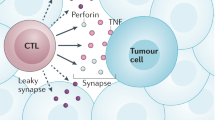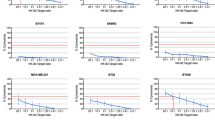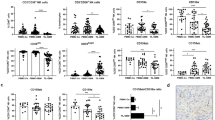Abstract
Natural and lymphokine activated killer cells (NK and LAK) are believed to play an important role in the control of tumour progression and metastasis. Their specific receptors on tumours cells are still unknown. Several studies suggest that these cells recognise and eliminate abnormal cells with deleted or reduced expression of MHC class I molecules. Previous reports suggest that interferons (IFN), by increasing MHC class I expression on target cells, induce resistance to killing by NK cells. We investigated the role of MHC molecule expression by two human breast cancer cell lines T47D and ZR75-1 in their susceptibility to NK and LAK cells. These two cell lines spontaneously express low levels of HLA class I antigens but no HLA class II molecules. After IFN-gamma treatment they both overexpressed MHC class I and de novo expressed class II molecules as detected by flow cytometry, quantified by a radioimmunoassay and analysed by two-dimensional gel electrophoresis. Opposed to untreated cells these IFN-gamma treated cells were resistant to NK and LAK lysis. Furthermore, preincubation of IFN-gamma treated breast cancer cells with F(ab')2 fragments of monoclonal antibodies to HLA class I and HLA class II molecules was unable to restore lysis. In contrast, several complete monoclonal antibodies including anti-HLA class I and HLA class II induced the lysis of target cells whether or not they had been treated by IFN-gamma. The therapeutic use of monoclonal antibodies directed against antigens expressed on tumour cells (ADCC) in conjunction with interferon therapy should be discussed in lymphokine-based strategies for treatment of cancer patients.
This is a preview of subscription content, access via your institution
Access options
Subscribe to this journal
Receive 24 print issues and online access
$259.00 per year
only $10.79 per issue
Buy this article
- Purchase on Springer Link
- Instant access to full article PDF
Prices may be subject to local taxes which are calculated during checkout
Similar content being viewed by others
Author information
Authors and Affiliations
Rights and permissions
About this article
Cite this article
Jabrane-Ferrat, N., Calvo, F., Faille, A. et al. Recombinant gamma interferon provokes resistance of human breast cancer cells to spontaneous and IL-2 activated non-MHC restricted cytotoxicity. Br J Cancer 61, 558–562 (1990). https://doi.org/10.1038/bjc.1990.125
Issue Date:
DOI: https://doi.org/10.1038/bjc.1990.125



